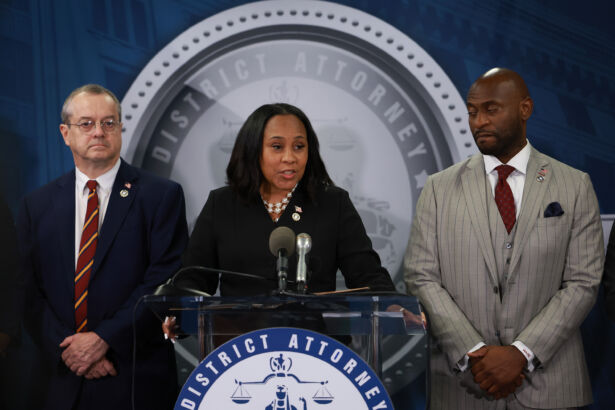Attorneys for former President Donald Trump filed motion on Monday asking a Fulton County judge to dismiss several charges against Mr. Trump in the Georgia racketeering case against him and 18 co-defendants.
The brief filings adopt co-defendant Rudy Giuliani’s arguments on seven charges, and co-defendant Kenneth Chesebro’s demurrer of one charge, and Mr. Chesebro’s demurrer of seven charges in his motion to dismiss the indictment entirely. Mr. Trump’s attorneys also filed a notice to have reciprocal discovery apply to his case under Georgia law.
Mr. Giuliani had served as an attorney for President Trump when he challenged the 2020 election results and initiated efforts to investigate alleged election fraud. Mr. Giuliani and President Trump were each charged with 13 counts, with seven of them overlapping.
Mr. Chesebro was also an attorney for President Trump in his challenge of the elections and was charged on seven counts.
All defendants were charged with violating Georgia’s Racketeer Influenced and Corrupt Organizations (RICO) Act.
Fulton County District Attorney Fani Willis is prosecuting the case, and has argued that the 19 defendants’ actions in challenging the state’s 2020 presidential race results constituted a “criminal racketeering enterprise.”
Arguments
Attorneys for Mr. Giuliani argued that the 98-page, 41-count racketeering indictment included several “deficiencies.”
They asked the judge to quash the indictment as it “is not perfect in form and substance, fails to provide sufficient notice as to what he must defend against at trial, and the pleadings in said indictment are insufficient to protect him from double jeopardy in a separate prosecution.”
They argued that the indictment mixed criminal acts with legal acts in a “conspiratorial bouillabaisse consisting of purported criminal acts, daily activities, and constitutionally protected speech.”
Mr. Chesebro asked the court to dismiss his case based on the Supremacy Clause of the U.S. Constitution, which puts federal law above state laws and courts.
The 21 acts the indictment alleges Mr. Chesebro participated in had all occurred before Georgia’s “safe harbor” deadline for submitting the state’s electoral ballots.
His attorneys argue that the electoral laws were established by Congress with the 1887 Electoral Count Act, a federal law to “govern how Congress would receive, adjudicate, and count the presidential elector ballots,” as well as oversee how ballots are disputed.
If and when states cannot issue a ruling on challenges to the election results, authority returns to Congress to resolve the disputes, they argued, as it took place with the Georgia challenge in 2020.
This had taken place with the 1960 election result disputes in Hawaii, which the alternate electors said they sought to emulate.
Mr. Chesebro also argued that if any action taken after Dec. 8, 2020, was illegal, it would be in violation of federal law, and not Georgia state law.
Mr. Chesebro, who has already asked for a speedy trial, which will begin Oct. 23, asked the judge to dismiss the indictment entirely.

High-Profile Case
Superior Court of Fulton County Judge Scott McAfee has already signed an order allowing recording in the court during the trial, which can be expected to be televised.
The prosecution filed a motion on Sept. 6, made public Sept. 8, to prevent juror identities from being publicized, arguing that such a widely publicized case could interfere with the jury’s impartiality, and that the court has an obligation to protect jurors from harrassment.
“The present case has been highly covered by the media thus far since the indictment,” the motion reads. “The State anticipated that press coverage of this case will continue, and likely increase, through the pedency of pretrial motions and the trial itself.”
It notes in particular that anonymous individuals on “conspiracy theory websites” shared personal info of grand jury members “with the intent to harass and intimidate them.”
Ms. Willis alleged that she and her family members have been subject to similar treatment, with their personal information shared online, “intertwined with derogatory and racist remarks.”
The prosecution did not ask the court to rescind the order to allow the trial to be televised.
The case has already held an all-day hearing on the request made by defendant Mark Meadows, chief of staff to the former president, to remove his case to federal court. The federal court hearing was not televised, but it was still closely watched and covered as it was the first time legal arguments were made in a case on President Trump’s challenge of the 2020 election results, which is also the subject of a federal case against the former president. The federal judge ultimately declined to try the case in federal court, and Mr. Meadows is appealing the decision in the 11th Circuit.
From The Epoch Times

